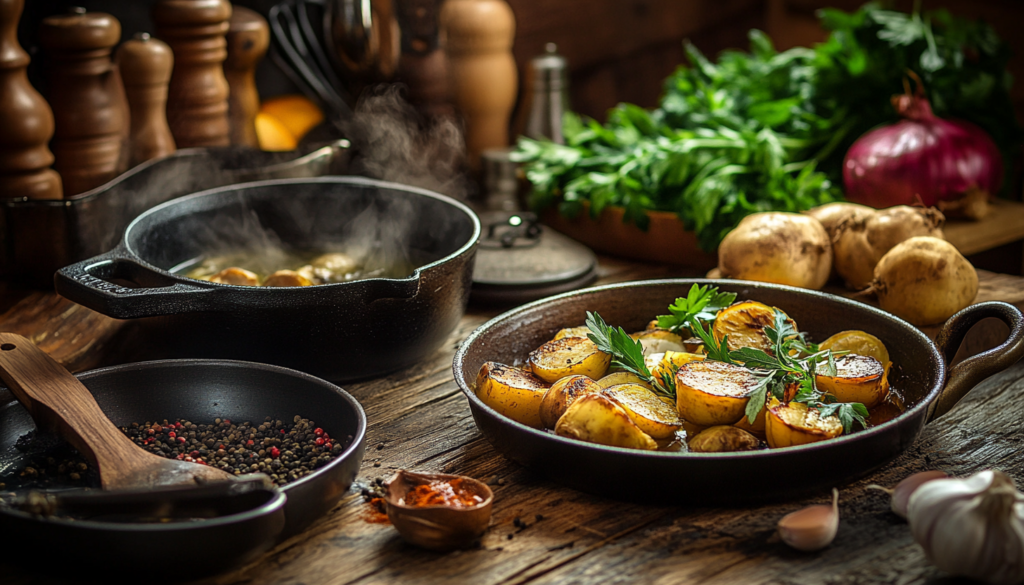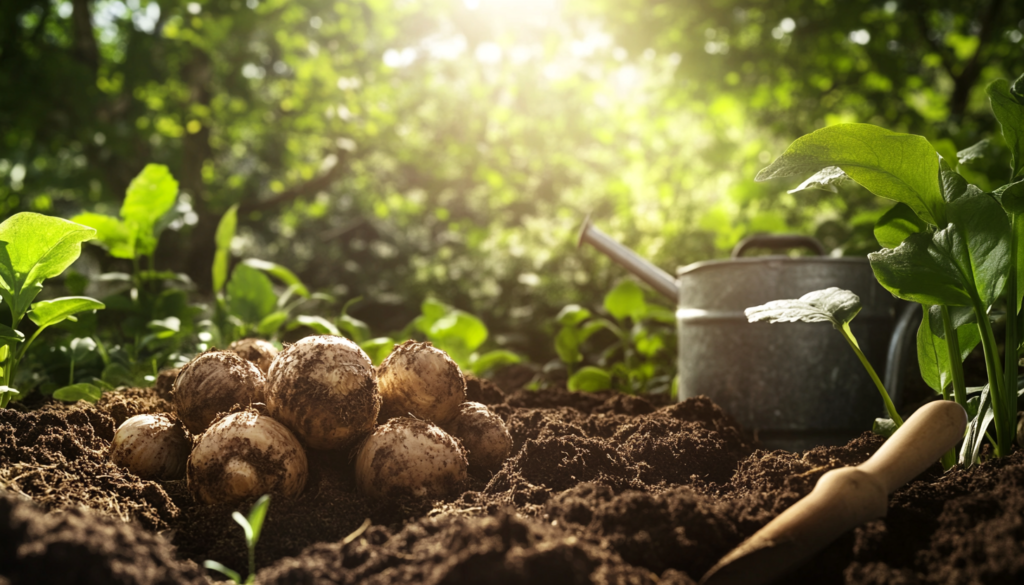Sunchokes, also known as Jerusalem artichokes, are a type of root vegetable that is gaining popularity for their unique flavor and impressive nutritional profile. This article will explore the history, health benefits, cooking methods, and delicious recipes featuring sunchokes to help you incorporate this versatile ingredient into your diet.

Key Takeaways
- Sunchokes are a type of root vegetable that offer a variety of health benefits.
- They have a unique, earthy flavor and can be prepared in many delicious ways.
- Sunchokes are a good source of fiber, antioxidants, and various vitamins and minerals.
- Incorporating sunchokes into your diet can support digestive health and blood sugar control.
- With proper storage and preparation, sunchokes can be enjoyed year-round.
Introduction to Sunchokes
Sunchokes, also known as Jerusalem artichokes, are the knobby and irregular-shaped tubers of a species of sunflower native to North America. These unique vegetables have a sweet, nutty flavor that has captivated people for centuries. With a rich history dating back to Native American tribes, sunchokes have continued to gain popularity as a versatile and nutritious addition to many diets.
What Are Sunchokes?
Sunchokes, botanically classified as Helianthus tuberosus, are the edible tubers of a sunflower plant. They have a distinctive appearance, with a knobby, irregularly shaped exterior and a creamy, almost translucent flesh when sliced open. The flavor of sunchokes is often described as a blend of artichoke and potato, with a subtle sweetness that sets them apart from other root vegetables.
The History of Sunchokes
Sunchokes have a long and fascinating history, having been cultivated by Native American tribes for centuries before the arrival of European explorers. These indigenous communities recognized the versatility and nutritional value of sunchokes, incorporating them into their diets and using them in various culinary and medicinal applications. When the vegetable was introduced to Europe in the 16th century, it quickly gained popularity and became a staple in many European cuisines.
Today, sunchokes continue to be enjoyed around the world, valued for their unique flavor, health benefits, and versatility in the kitchen. As more people discover the wonders of this underappreciated vegetable, the demand for sunchokes continues to grow, making them an increasingly common sight in markets and on plates everywhere.
Nutritional Value of Sunchokes
Sunchokes, also known as Jerusalem artichokes, are a nutrient-dense vegetable that offer a range of essential vitamins and minerals. These versatile tubers are a good source of fiber, potassium, iron, and B vitamins, making them a healthy addition to any diet.
One of the standout features of sunchokes is their low calorie count. With just approximately 100 calories per cup, they are a great choice for those watching their weight or looking to incorporate more low-calorie options into their meals. Additionally, sunchokes contain a unique type of carbohydrate called inulin, which may have prebiotic benefits for gut health.
| Nutrient | Amount per 1 cup (150g) of Sunchokes |
|---|---|
| Calories | 100 |
| Fiber | 2.4g |
| Potassium | 454mg |
| Iron | 2mg |
| Vitamin B6 | 0.2mg |
With their impressive sunchokes nutrition and Jerusalem artichoke benefits, it’s no wonder these versatile tubers are gaining popularity as a nutritious and delicious ingredient in many households.
Health Benefits of Sunchokes
Sunchokes, also known as Jerusalem artichokes, offer a variety of potential health benefits. These versatile root vegetables are packed with essential nutrients and may provide several advantages for overall well-being.
Sunchokes and Digestion
One of the primary health benefits of sunchokes is their positive impact on digestive health. Sunchokes are a rich source of inulin, a type of dietary fiber that acts as a prebiotic. Prebiotics nourish the beneficial bacteria in the gut, promoting a healthy microbiome. This can lead to improved digestion, enhanced nutrient absorption, and a stronger immune system.
Sunchokes and Blood Sugar Control
Sunchokes have a low glycemic index, making them a suitable option for individuals with diabetes or those following a low-carb diet. The inulin content in sunchokes is slowly broken down, resulting in a gradual release of glucose into the bloodstream. This can help regulate blood sugar levels and prevent spikes and crashes, which is particularly beneficial for those managing blood sugar-related conditions.
In addition to their digestive and blood sugar-regulating properties, sunchokes are also a good source of sunchokes nutrition, providing essential vitamins, minerals, and antioxidants. Consuming sunchokes as part of a balanced diet may contribute to overall Jerusalem artichoke benefits, such as improved immune function, reduced inflammation, and enhanced cardiovascular health.
“Sunchokes are a versatile and nutritious root vegetable that offer a range of potential health benefits, from supporting digestive health to helping regulate blood sugar levels.”
However, it’s important to note that while sunchokes are generally well-tolerated, some individuals may experience sunchoke side effects, such as gas or bloating, especially when consumed in large quantities. As with any new food, it’s recommended to introduce sunchokes gradually and monitor individual reactions.
Cooking with Sunchokes
Sunchokes, also known as Jerusalem artichokes, are a versatile root vegetable that can be prepared in a variety of ways. From roasting to sautéing, these unique tubers offer a range of cooking possibilities that can enhance any meal. Exploring the various sunchokes cooking methods can help you unlock the true potential of this underrated ingredient.
Sunchoke Cooking Methods
Sunchokes are incredibly adaptable, allowing you to showcase their delicate, nutty flavor through different cooking techniques. Here are some of the most popular sunchoke recipes and cooking methods to try:
- Roasting: Toss sunchoke pieces with olive oil, salt, and pepper, then roast at high heat until tender and caramelized.
- Sautéing: Slice or cube sunchokes and sauté them in a pan with butter or oil until they develop a golden-brown exterior.
- Boiling: Boil sunchokes in salted water until tender, then mash them into a creamy purée or incorporate them into soups and stews.
- Raw: Shred or slice sunchokes and add them to salads for a crunchy, refreshing texture.
Sunchokes can also be grilled, steamed, or even baked into a casserole for a hearty, comforting dish. Experiment with different sunchokes cooking methods to find your favorite way to enjoy these versatile tubers.

“Sunchokes are a game-changer in the kitchen. Their ability to adapt to various cooking techniques makes them a valuable addition to any home cook’s repertoire.”
When cooking sunchokes, keep in mind that their texture can become soft and creamy, making them a great addition to soups, stews, and mashed vegetable dishes. Explore the endless possibilities of sunchoke recipes and discover new ways to incorporate this unique ingredient into your meals.
Sunchoke Recipes
Sunchokes, also known as Jerusalem artichokes, are a versatile vegetable that can be used in a variety of delicious recipes. From savory soups and stews to flavorful side dishes, sunchokes offer a unique and earthy flavor that can elevate any meal. In this section, we’ll explore some of the best sunchoke recipes to try in your kitchen.
Sunchoke Soup Recipes
One of the most popular ways to enjoy sunchokes is in a creamy, comforting soup. Sunchoke soup can be made in a variety of ways, such as with roasted sunchokes, pureed with broth, or combined with other vegetables like leeks or potatoes. These sunchoke soup recipes offer a nourishing and satisfying way to incorporate this nutritious vegetable into your diet.
- Creamy Sunchoke Soup with Thyme
- Roasted Sunchoke and Cauliflower Soup
- Sunchoke and Potato Chowder
Sunchoke Side Dish Recipes
Sunchokes also make excellent side dishes, whether roasted, grilled, or sautéed. Their slightly nutty and sweet flavor pairs well with a variety of herbs and seasonings, making them a versatile addition to your meal. Try these delicious sunchoke side dish recipes to showcase the vegetable’s unique qualities.
- Roasted Sunchokes with Garlic and Rosemary
- Sunchoke Gratin with Parmesan and Breadcrumbs
- Sautéed Sunchokes with Lemon and Parsley
Experimenting with sunchokes in the kitchen can help you discover new ways to enjoy this unique and flavorful vegetable. Whether you opt for a comforting soup or a delightful side dish, sunchokes are sure to add a delicious and nutritious twist to your meals.
What Are Sunchokes? Health Benefits, Cooking Tips, and Recipes
Sunchokes, also known as Jerusalem artichokes, are a unique and versatile vegetable that have gained popularity in recent years. These knobby, irregularly shaped tubers are the roots of a sunflower-like plant and offer a surprising array of health benefits and culinary possibilities.
Packed with essential nutrients, sunchokes are a rich source of inulin, a type of dietary fiber that can help regulate blood sugar levels and support healthy digestion. They also contain respectable amounts of vitamins and minerals, including vitamin C, potassium, iron, and phosphorus.
Sunchoke Nutritional Profile
- Fiber: Sunchokes are a excellent source of inulin, a prebiotic fiber that promotes gut health.
- Vitamins and Minerals: They contain vitamin C, potassium, iron, and phosphorus.
- Low in Calories: With only around 100 calories per cup, sunchokes are a nutritious, low-calorie option.
Cooking with Sunchokes
Sunchokes are incredibly versatile in the kitchen. They can be roasted, sautéed, mashed, or even eaten raw in salads. When cooking sunchokes, it’s important to scrub them well and trim off any blemishes, as their skin can be rather knobby and uneven.
For a delicious side dish, try roasting sunchokes with olive oil, garlic, and herbs. Their nutty, earthy flavor pairs beautifully with proteins like chicken or fish. Sunchokes can also be incorporated into soups, stews, and even baked into chips for a healthy snack.
Sunchoke Recipes to Try
- Sunchoke Soup with Crispy Bacon
- Roasted Sunchokes with Rosemary and Parmesan
- Sunchoke and Apple Slaw
- Sunchoke Gratin with Gruyère Cheese
By understanding the unique properties of sunchokes and how to best incorporate them into your meals, you can unlock a world of flavorful and nutritious culinary possibilities.
Buying and Storing Sunchokes
When it comes to purchasing and storing sunchokes, a few key considerations come into play. Sunchokes, also known as Jerusalem artichokes, are typically in season from late fall through early spring, with peak availability during the winter months. This makes it the prime time to seek out these unique root vegetables.
Sunchoke Season
To ensure you’re getting the freshest sunchokes, look for them at local farmers’ markets, specialty grocery stores, or even directly from growers during the sunchoke season. The tubers should be firm, unblemished, and free of any signs of damage or decay. Their appearance can vary, with some being knobby and irregular in shape, while others may be more smooth and uniform.
Storing Sunchokes
- To store sunchokes, wrap them in a damp paper towel or cloth and refrigerate them for up to two weeks.
- Avoid leaving them at room temperature for extended periods, as this can cause them to shrivel and lose their freshness.
- When ready to use, give the sunchokes a good scrub to remove any dirt or debris, and they’re ready to be prepared in a variety of delicious dishes.
By keeping these sunchoke storage tips in mind, you can ensure you’re making the most of this versatile and nutritious root vegetable all throughout the sunchoke season.
Potential Side Effects of Sunchokes
While sunchokes, also known as sunchoke side effects, are generally safe for most people to consume, there are a few potential side effects to be aware of. The inulin content in sunchokes, a type of dietary fiber, may cause digestive issues such as gas, bloating, or diarara in some individuals, especially if large quantities are consumed.
It’s recommended to introduce sunchokes into your diet gradually and monitor your body’s response. Start with small portions and gradually increase the amount you consume to allow your digestive system to adjust. This can help minimize any potential sunchoke side effects and ensure you can enjoy the many health benefits of this versatile vegetable.
- Digestive issues like gas, bloating, and diarara may occur due to the inulin content in sunchokes.
- Introduce sunchokes into your diet gradually to allow your body to adjust and minimize sunchoke side effects.
- Monitor your body’s response when consuming sunchokes and adjust your portion sizes accordingly.
By being mindful of potential sunchoke side effects and taking steps to introduce them into your diet slowly, you can enjoy the many health benefits of this unique root vegetable.
Sunchokes and Weight Loss
When it comes to weight management, sunchokes, also known as Jerusalem artichokes, may offer some surprising benefits. These unique root vegetables are low in calories and high in fiber, making them a potentially valuable addition to a weight-loss or weight-maintenance diet.
The inulin present in sunchokes is a type of dietary fiber that has been shown to promote feelings of fullness and support healthy digestion. This can be particularly helpful for individuals trying to lose weight or maintain a healthy weight, as it may help curb cravings and support regular bowel movements.
| Nutrient | Amount per 100g of Sunchokes |
|---|---|
| Calories | 73 |
| Carbohydrates | 17g |
| Fiber | 2g |
| Protein | 2g |
While the potential weight-loss benefits of sunchokes are promising, it’s important to note that more research is needed to fully understand the relationship between sunchokes and weight management. As with any dietary change, it’s always best to consult with a healthcare professional before incorporating sunchokes into a weight-loss plan.
“Sunchokes are a versatile and nutritious root vegetable that may offer some interesting benefits for those looking to manage their weight.”
Overall, the low-calorie content and high fiber levels of sunchokes make them an interesting addition to a balanced, nutrient-dense diet. Whether you’re looking to lose weight or simply maintain a healthy lifestyle, incorporating sunchokes into your meals could be a tasty and potentially beneficial choice.
Growing Sunchokes at Home
For those interested in cultivating their own sunchoke harvest, the process is relatively straightforward. Sunchokes, also known as Jerusalem artichokes, thrive in well-drained soil and full sun. The planting season typically occurs in the spring or fall, with the tubers ready for harvest in the autumn after the plant’s foliage has died back.
To get started, prepare the soil by loosening it to a depth of about 8 inches and incorporating organic matter, such as compost or aged manure. Sunchoke tubers can then be planted about 12 inches apart and 4 inches deep. As the plants grow, they will reach heights of up to 8 feet, creating an impressive display in the garden.
- Choose a sunny, well-drained spot in your garden for planting sunchokes.
- Prepare the soil by mixing in organic matter, such as compost or aged manure.
- Plant the sunchoke tubers about 12 inches apart and 4 inches deep.
- Harvest the tubers in the fall, after the plant’s foliage has died back.
| Planting Season | Soil Preparation | Planting Depth | Harvest Time |
|---|---|---|---|
| Spring or Fall | Well-drained soil with organic matter | 4 inches deep | Fall, after foliage dies back |
With proper care and attention, sunchokes can be a rewarding addition to any home garden, providing a bountiful harvest and a unique culinary experience throughout the sunchoke season.

“Growing sunchokes at home is a fun and rewarding experience. The plants are easy to care for and provide a delicious harvest that can be enjoyed in a variety of dishes.”
Conclusion
In conclusion, sunchokes, also known as Jerusalem artichokes, are a unique and nutritious root vegetable that deserve a place in more kitchens across the United States. With their versatile cooking methods, range of health benefits, and delicious flavor profile, sunchokes offer an excellent opportunity to diversify your diet and explore new culinary experiences.
Whether you’re roasting them, incorporating them into soups, or enjoying them raw in salads, sunchokes are a versatile ingredient worth adding to your culinary repertoire. With their nutritional value and potential weight loss benefits, sunchokes can be a valuable addition to a healthy, balanced diet.
So, why not give these unique root vegetables a try? Explore the sunchoke season, learn the proper storage tips, and experiment with the wide range of sunchoke recipes available. Discover the delightful flavors and health-boosting properties of this underappreciated vegetable, and unlock a whole new world of culinary possibilities.
FAQ
What are sunchokes?
Sunchokes, also known as Jerusalem artichokes, are a type of root vegetable that are the tubers of a species of sunflower native to North America. They have a knobby, irregular shape and a sweet, nutty flavor.
What are the health benefits of sunchokes?
Sunchokes are a nutrient-dense vegetable, providing a range of essential vitamins and minerals. They are a good source of fiber, potassium, iron, and B vitamins. Additionally, sunchokes contain a type of carbohydrate called inulin, which may have prebiotic benefits for gut health.
How can sunchokes be cooked?
Sunchokes are a versatile ingredient that can be prepared in various ways. They can be roasted, sautéed, boiled, or even eaten raw in salads. When cooking sunchokes, it’s important to note that their texture can become soft and creamy when cooked, making them a great addition to soups, stews, and mashed vegetable dishes.
What are some delicious sunchoke recipes?
Sunchokes can be used in a wide range of recipes, from savory soups and stews to roasted side dishes. Some popular sunchoke recipes include creamy sunchoke soup, roasted sunchokes with herbs, and sunchoke gratin.
Are there any potential side effects of consuming sunchokes?
While sunchokes are generally safe for most people to consume, the inulin content in sunchokes may cause digestive issues, such as gas, bloating, or diarrhea, in some individuals, especially if large quantities are consumed. It’s recommended to introduce sunchokes into your diet gradually and monitor your body’s response.
When is sunchoke season?
Sunchokes are typically in season from late fall through early spring, with peak availability during the winter months.
How should sunchokes be stored?
To store sunchokes, wrap them in a damp paper towel or cloth and refrigerate them for up to two weeks.

